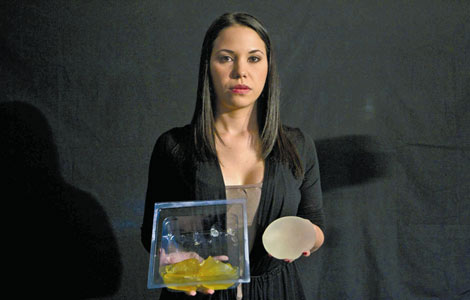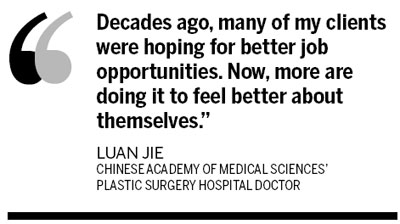Abreast of real risks
Updated: 2012-01-07 07:55
By Mei Jia (China Daily)
|
||||||||
|
 Rita De Martino, 27, a Venezuelan journalist, holds her removed defective silicone gel breast implants, manufactured by the now-defunct French company Poly Implant Prosthesis (PIP). De Martino had surgery to insert PIP breast implants in 2004. She learned in February 2011 that the left prosthesis had ruptured, and had both removed the following April. [Carlos Garcia Rawlins / Reuters] |
Doctors say panic among Chinese breast implant recipients is overblown after a French producer made sub-par prostheses. Mei Jia reports.
Beijing entrepreneur Cui Xi (not her real name) is among the thousands of frantic women calling their plastic surgeons since it was uncovered that a French company used sub-par industrial grade silicone for the prostheses.
The 44-year-old says she is relieved to know her implants came from the US, not France.
"My family and friends have also been calling me to check on my health," Cui says.
She says she also knows many other at-risk women are reluctant to come forward and get checkups.
Hangzhou Plastic Surgery Hospital doctor Tan Xiaoyan, who has been performing breast implant surgeries since 1985, says she has been so "overwhelmed" with calls that it has disrupted her work.
The same is true for her contemporaries in such cities as Beijing, Guangdong's provincial capital Guangzhou and Shanghai, Chinese Academy of Medical Sciences' Plastic Surgery Hospital doctor Luan Jie says. Luan represents the Chinese Medical Association's plastic surgeons.
The company in question is the now bankrupt Poly Implant Prosthesis (PIP). PIP was the world's third largest implant manufacturer and has sold about 300,000 prostheses worldwide, Reuters reports.
Recipients' anxieties grew when French authorities urged 30,000 women in the country to replace or remove PIP prostheses on Dec 23.
Some French complain the media has exaggerated the potential dangers, as Reuters reports.
China's plastic surgery association held a news conference in Beijing last week to "be responsible and scientific" in informing the public of the realities of risks.
Luan, who represents the country's 37 leading implant surgeons, says at least 100,000 women have undergone the operation since the practice began in China 30 years ago.
Very few received PIP prostheses, as the company only received approval from China's State Food and Drug Administration in April 2009. The scandal erupted in March 2010.
Luan says the association has seen "rare cases" of ruptures and unanimously agrees the risk of cancer is uncertain.
He points out the prostheses are not implanted in the mammary glands, so they don't affect such functions as breastfeeding.
The State Food and Drug Administration told China Daily on Dec 30 that it has started an investigation into PIP products in China. It is also in contact with the French side to evaluate the risks and to develop detailed suggestions on settlements, the administration's news officer Shen Chen says.
According to an announcement that appeared a day later on the administration's official website, 912 pairs of PIP prostheses have been imported into China, 151 of which haven't been sold.
The administration says it has not yet received reports of adverse health effects suffered by recipients. It has called for the end of PIP implant sales and for the start of recipient data collection.
Women with PIP prostheses should be wary of deformation or stiffening, the association says.
A growing number of Chinese are getting implants, despite the cost of up to 60,000 yuan ($9,600).
Tan, from the Hangzhou hospital, says many of her customers are previous customers' daughters.
Luan says he had a client a week in the 1980s and now has 200 a year.
The customer profile has expanded from celebrities like actresses to ordinary workers and housewives, he says. Most are 20 to 40 years old.
He believes social transformation and higher incomes are responsible for the increase.
"Decades ago, many of my clients were hoping for better job opportunities," Luan says.
"Now, more are doing it to feel better about themselves."
Cui, the Beijing resident who got transplants, says she did it to elevate her self-confidence, although her husband opposed her decision. She even advised friends to try.
"It's a fulfillment of my wish," she says.
"I knew about the risks beforehand."
Luan believes plastic surgeries are helpful for clients with certain emotional problems, such as low self-esteem. But operations can't entirely solve their issues, he explains.
Association doctors say breast implants are only for women older than 22, who are psychologically and physically healthy.
Tan, who operates on about 300 clients a year, says clients must take psychological tests before their surgeries, and 5 percent to 10 percent are found unfit.
"Plastic surgeons are like psychologists," Luan says.
"But we can't repair broken marriages or ensure promotions."


 'Taken 2' grabs movie box office crown
'Taken 2' grabs movie box office crown
 Rihanna's 'Diamonds' tops UK pop chart
Rihanna's 'Diamonds' tops UK pop chart
 Fans get look at vintage Rolling Stones
Fans get look at vintage Rolling Stones
 Celebrities attend Power of Women event
Celebrities attend Power of Women event
 Ang Lee breaks 'every rule' to make unlikely new Life of Pi film
Ang Lee breaks 'every rule' to make unlikely new Life of Pi film
 Rihanna almost thrown out of nightclub
Rihanna almost thrown out of nightclub
 'Dark Knight' wins weekend box office
'Dark Knight' wins weekend box office
 'Total Recall' stars gather in Beverly Hills
'Total Recall' stars gather in Beverly Hills
Most Viewed
Editor's Picks

|

|

|

|

|

|
Today's Top News
Health new priority for quake zone
Xi meets US top military officer
Japan's boats driven out of Diaoyu
China mulls online shopping legislation
Bird flu death toll rises to 22
Putin appoints new ambassador to China
Japanese ships blocked from Diaoyu Islands
Inspired by Guan, more Chinese pick up golf
US Weekly

|

|






